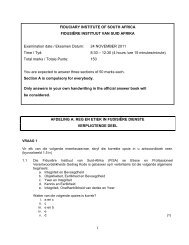Ngwenyama v Mayelane wedding after customary wedding
Ngwenyama v Mayelane wedding after customary wedding
Ngwenyama v Mayelane wedding after customary wedding
You also want an ePaper? Increase the reach of your titles
YUMPU automatically turns print PDFs into web optimized ePapers that Google loves.
13<br />
[20] Although the above was stated in the context o f polygynous Muslim<br />
marriages, by parity of reasoning, it equally appli es to polygynous marriages<br />
concluded in accordance with <strong>customary</strong> law. It will be recalled that the Act<br />
was promulgated in response to constitutional value s and human rights, more<br />
specifically the right to equality and non-discrimi nation. If this court were to<br />
uphold the interpretation of s 7(6) adopted by the court a quo, it would be<br />
seriously undermining the very equality that the Ac t seeks to uphold.<br />
[21] The discriminatory interpretation of s 7(6) ex cluding women in<br />
polygamous marriages, validly married according to <strong>customary</strong> law, and<br />
recognised as such in their communities is deeply i njurious to women in such<br />
marriages as it affects them negatively. Such women would be adversely<br />
affected in the areas of, inter alia, succession, d eath and social standing. It<br />
constitutes a gross and fundamental infringement of their right to dignity, right<br />
to equal status in marriage as well as the rights t o physical and emotional<br />
integrity. The effect extends to children born of s uch a marriage, who would,<br />
by virtue of the interpretation accorded to s 7(6) by the court a quo, be<br />
instantly rendered illegitimate. The harsh conseque nces of such a declaration<br />
on the children are unthinkable. Furthermore, such an interpretation would be<br />
in stark contrast with the manner in which the peop le affected live their lives.<br />
For example, if all the requirements of a <strong>customary</strong> marriage have been<br />
complied with and the wife is for all intents and p urposes socially recognised<br />
as a wife, and non-compliance with the section rend ers her unmarried, that<br />
would be out of step with the living <strong>customary</strong> law. The very purpose for which<br />
the Act was intended, equality of recognition and s pouses of <strong>customary</strong><br />
marriages, would be defeated. An interpretation tha t renders a polygamous<br />
<strong>customary</strong> marriage recognised in <strong>customary</strong> law inva lid, is clearly untenable<br />
and could not have been intended by the legislature . In line with the purposive<br />
approach outlined in Hyundai, that courts must prefer an interpretation of<br />
legislation that falls within the constitutional bo unds over that which does not,<br />
if such an interpretation can be reasonably ascribe d to the section, it follows<br />
that the decision of the court a quo cannot be conf irmed.



![Motsepe v Khoza customary marriage and child[3]](https://img.yumpu.com/44777240/1/184x260/motsepe-v-khoza-customary-marriage-and-child3.jpg?quality=85)


